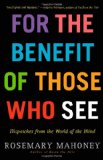Summary | Excerpt | Reviews | Beyond the Book | Readalikes | Genres & Themes | Author Bio

Dispatches from the World of the Blind
by Rosemary Mahoney
The other important criterion for attendance at this school was that the student had to be either legally or entirely blind. Thirteen of them were completely blind. The rest were in various stages of blindness, low vision, or visual impairment. Some could see a little light, a little color; some could see objects dimly; a few could read printed type if the type was very large and they pressed their noses up to the page. Most could read Braille; most were in possession of a white cane.
My reason for going to India to teach blind and visually impaired people was not that I wanted to teach English or live in India. I have never really wanted to teach, and I might as well say now that, although I've tried over the years to see the charm of India, after five separate trips there—a couple of them extended—I still do not see the charm of India. No, I was teaching at this school solely because I had developed a strong curiosity about blindness and wanted to meet blind people, to spend time with them, to get to know them, to find out how they think, to see how they live in the world, how they navigate, how they talk and eat and dress and write and shave and brush their teeth, and learn just about anything else I could about blind people without trespassing too far beyond the limits of decency. Teaching in a school for the blind seemed to me a good way to learn, and I was given the rare chance to do that in Trivandrum, Kerala.
I had begun to develop this interest in the blind four years before, when an American magazine sent me to Tibet to write an article about Sabriye Tenberken, the blind German woman who, together with her sighted Dutch partner, Paul Kronenberg, founded Braille Without Borders, Tibet's first school for the blind. At the time that I went to Tibet, I had no real interest in blindness beyond the usual reflexive dread of it, the usual pity for people who couldn't see, the usual fearful wish that it would never ever happen to me. My dread of blindness was great enough that I was even a little apprehensive about meeting Sabriye. In preparation for my trip to Tibet I read a book she wrote about her experiences and saw photos of her (she looked normal enough, presentable enough; when I accidentally held her photo upside down for a moment, she looked oddly like me when I was younger); she was by all accounts a brave, adventurous, highly intelligent person, but still, she was blind, and that big, terrible fact made me uneasy and even reluctant to meet her. I didn't know what was the appropriate way to behave with a blind person, whether there was some particular etiquette I should follow. There must, I thought, be rules about relating to a person so extremely disadvantaged in the game of life. The unfamiliarity of it worried me and the bleakness of it depressed me a little. I was forty-five years old at the time and had rarely spoken to a blind person.
My first encounter with a blind person took place thirty years ago in the waiting room of Raidió Teilifís Éireann, the Irish broadcasting company in Dublin. I was sitting on a couch waiting to do a radio interview when a blind woman came into the room with a guide dog and sat down next to me. She was moonfaced and pale and wore a red dress and black patent-leather shoes. Her thin hair was cut in blunt bangs across her forehead, and over her ears she wore the bulky headphones of a Walkman that she held lightly in her right hand. The guide dog lay on his side and stared dully at the woman's glistening shoes while she listened to music with her eyes closed. Her eyes were slightly sunken, and the lids had a darkish hue, as if lightly dusted with coal ash. I was enthralled by the pair. The woman's nose twitched repeatedly, as though she were investigating a breeze or a scent that was wafting across her face. Presently, a short bald man poked his head through a doorway and said to the blind woman, "I suppose you'd better come and operate the switch, Lisa." She unplugged the headphones from the device, removed them from her ears, stuffed them into her handbag, then abruptly lifted the Walkman to within an inch of my chin and, with bold authority, said, "Pardon me, madam. I want to be sure the machine is off. Is it off?"
Excerpted from For the Benefit of Those Who See by Rosemary Mahoney. Copyright © 2014 by Rosemary Mahoney. Excerpted by permission of Little Brown & Company. All rights reserved. No part of this excerpt may be reproduced or reprinted without permission in writing from the publisher.
Censorship, like charity, should begin at home: but unlike charity, it should end there.
Click Here to find out who said this, as well as discovering other famous literary quotes!
Your guide toexceptional books
BookBrowse seeks out and recommends the best in contemporary fiction and nonfiction—books that not only engage and entertain but also deepen our understanding of ourselves and the world around us.